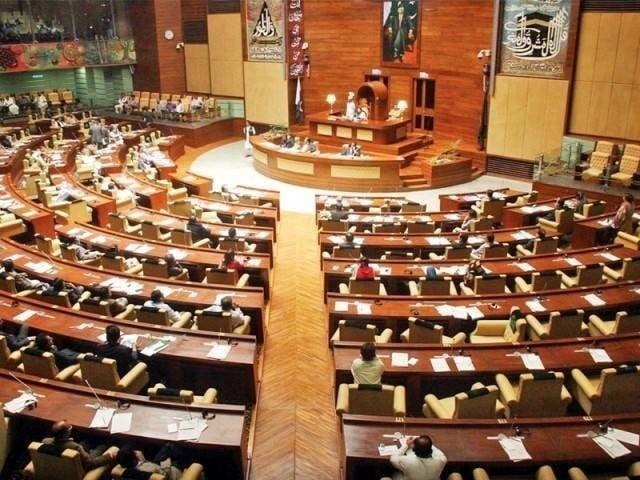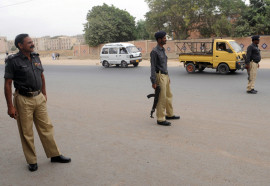
Meanwhile, the Judiciary is being over-burdened with the task of settling these disputes, of course to the annoyance of one of the two parties to the conflict.
Sindh CM appears before NAB in fake accounts case
The police conundrum
The Sindh chief minister, reacting on the killing of an infant by some trigger-happy cop, once again insisted that despite having a constitutional authority, his government's administrative control over the police force has been jeopardised following the Centre's interference and some judicial orders.
This administrative confusion, which the Sindh CM was attributing to the actions of the Centre and Judiciary, was in fact caused by politically-motivated decisions of Sindh's elected government. The PPP government did away with the Police Order 2002 in 2011, which was otherwise a progressive law, and restored the British-era Police Act of 1861. (The Punjab and Khyber Pakhtunkhwa governments, however, preferred to continue with the Police Order 2002).
The situation worsened in 2016 when the then police IG AD Khowaja expressed his reluctance to use his force for political score settling. The Sindh government retaliated, sending Khowaja on 'forced leave' first and then ordering his transfer, besides depriving the IG of his powers to regulate transfers and postings in his force.
The civil society took up the issue with the superior judiciary and the Sindh government suffered a major setback in September 2017 when the Sindh High Court (SHC) set aside its orders, curtailing the powers of the police chief and maintained that the provincial police chief enjoyed full autonomy to manage and regulate the operation, transfer and postings in his department. The court also ruled against the transfer of an IG without the completion of his three-year tenure. An appeal against the SHC's verdict was also dismissed by the Supreme Court in March 2018.
Later, the apex court in another verdict on January 30 this year, while clarifying the confusion created by the 18th Amendment, declared that police was a 'concurrent subject' and both the federal and provincial government could legislate on the subject. "For securing integrity, competence, diligence in and accountability for police performance, the Federation may consider framing a law setting out uniform criteria of appointment on sector order posts, their independence of operation, security of tenure, performance assessment and accountability of incompetence, negligence or dishonesty," states the SC order. (This was followed by another decision of the apex court dismissing the Sindh government's plea to retain control of three major health facilities of Karachi -- the Jinnah Post Graduate Medical Centre, National Institute of Cardiovascular Diseases, and the National Institute Child Health.
The spillover
All these rifts and confusion over the exercise of authority on certain subjects by the Federal and provincial governments are the natural outcome of the ill-conceived and hurriedly drawn but much trumpeted 18th Amendment. Add to it the lust of PPP leaders to have control over all the levers of power and authority, while depriving all the institutions under the Sindh government's control of administrative and functional autonomy and making them subservient to the whims and wishes of the party leadership.
Look what they have done with the local government laws which leave union committees or union councils powerless even to remove garbage. Far more alarming are amendments introduced by Sindh government in laws governing institutions of higher learning, especially the universities and medical and engineering colleges. Not only have these institutions been deprived of their administrative and financial powers, but their academic freedom and autonomy too, with the provincial government empowering itself even to decide the admissions policy and the courses of studies.
In Sindh Assembly, PPP MPAs snub attempts to roll back 18th Amendment
The superior judiciary has even directed the provincial government to bring about changes in the law, rules and regulations to improve the performance of the police department besides granting it an autonomous status. In this regard, the judiciary had also suggested a set of recommendations. But the Sindh government, unwilling to reconcile with the idea of an independent institutional set-up, is dragging its feet on it. The SHC had rather been moved to initiate contempt of court proceedings against the chief minister and the chief secretary for their failure to implement these recommendations calling for complete reforms in the police setup.
It was in this background that Murad Ali Shah, while speaking in the Sindh Assembly on February 11 following the killing of a political activist, maintained that the independence made available to police through judicial orders has made the province a virtual police state. "See this will happen if there is no political oversight over police," he had argued.
And now this tug of war seems to be leading to a constitutional deadlock between the Centre and Sindh unless the provincial government implements the police reforms ordered by the superior judiciary. The Sindh government should remember that even if the Centre surrenders to its demands, judicial orders will continue to hold ground.
Published in The Express Tribune, April 20th, 2019.




1716998435-0/Ryan-Reynolds-Hugh-Jackman-(3)1716998435-0-165x106.webp)










1730706072-0/Copy-of-Untitled-(2)1730706072-0-270x192.webp)
COMMENTS
Comments are moderated and generally will be posted if they are on-topic and not abusive.
For more information, please see our Comments FAQ